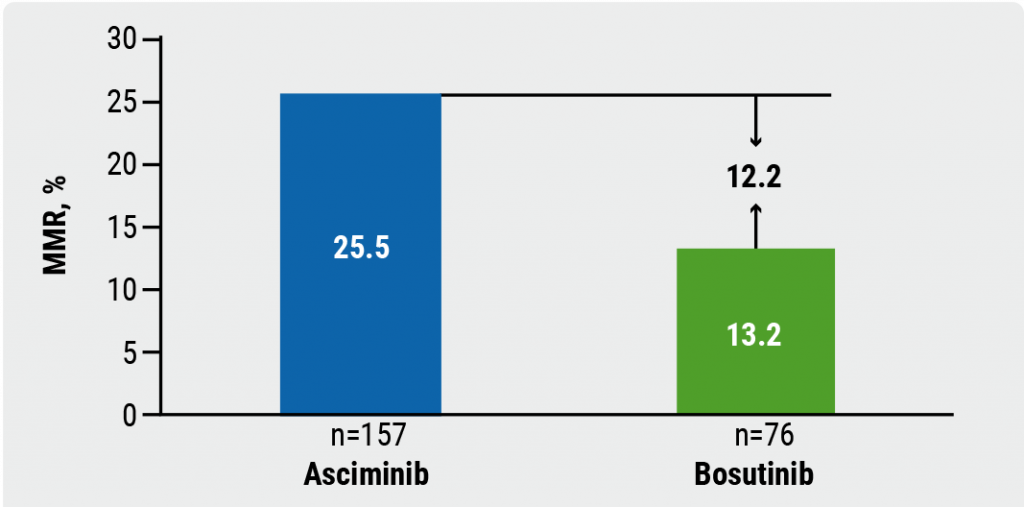Age and certain comorbid conditions, including haematologic malignancies, are associated with an increased risk of developing severe COVID-19 [2]. Thus, data on specific malignancies is essential to decipher the impact of patient-, disease-, and therapy-related factors on COVID-19 outcomes [1]. Dr Delphine Rea (Université de Paris, France) presented the CANDID study, a non-interventional retrospective and prospective study, aimed to analyse characteristics of COVID-19 among CML patients. The international CML Foundation (iCMLf) sent an anonymised case collection form to its global network of CML-treating physicians and partner organisations. In total, 110 cases of COVID-19 were reported to iCMLf from 20 countries: 61% from Europe, 15% from Asia, 12% from South America, 10% from North America, 2% from Africa, and 1% from Oceania. In the 102 symptomatic patients (93%), COVID-19 was considered mild (i.e. no hospitalisation) in 45%, moderate (i.e. hospitalisation) in 17%, severe (i.e. intensive care) in 17%, and of unknown severity in 14%.
The mortality rate from COVID-19 in evaluable CML patients was 13.7%. Factors associated with a higher mortality rate were:
- older age: 75 years 60% versus <75 years 7% (P<0.001);
- severity of COVID-19: severe 63% versus non-severe 0% (P<0.001); and
- imatinib treatment: imatinib 25% versus 2nd generation tyrosine kinase inhibitor (TKI) 3% versus no TKI 0% (P=0.003).
However, imatinib may represent a confounder rather than a true adverse prognostic predictor considering the strong link between imatinib treatment and advanced age.
Altogether, these data suggest that CML may not represent a particular vulnerability, although few exceptions may exist, such as blast crisis. Further case reports and longer follow up are needed to better ascertain independent risk factors, the impact of COVID-19, and the possible role that TKI type may play in this population.
- Rea D, et al. COVID-19 in Patients (pts) with Chronic Myeloid Leukemia (CML): Results from the International CML Foundation (iCMLf) CML and COVID-19 (CANDID) Study. 62nd ASH Annual Meeting, 5-8 December 2020. Abstract 649.
- Lee LY, et al. Lancet. 2020;395:1919-26.
Posted on
Previous Article
« Allogeneic SARS-CoV-2-specific T cells to treat COVID-19 Next Article
More complicated course of COVID-19 in leukaemia patients »
« Allogeneic SARS-CoV-2-specific T cells to treat COVID-19 Next Article
More complicated course of COVID-19 in leukaemia patients »
Table of Contents: ASH 2020
Featured articles
COVID-19
More complicated course of COVID-19 in leukaemia patients
Older age and imatinib treatment associated with COVID-19 mortality in CML
Allogeneic SARS-CoV-2-specific T cells to treat COVID-19
More severe COVID-19 outcomes for patients with haematologic malignancies
Acute Lymphoblastic Leukaemia
Improved outcomes, but still substantial part experiences relapses
Strong correlation between peripheral blood and bone marrow NGS MRD
Encouraging outcomes after autoHCT in patients with ALL
Acute Myeloid Leukaemia
Prognostic validity of AML composite model in predicting mortality
Venetoclax plus hypomethylating agents in favourable-risk AML
Encouraging clinical activity of decitabine plus ipilimumab in R/R or secondary MDS/AML
AML patients with specific mutations are unlikely to achieve MRD
Comparable outcomes with gilteritinib or quizartinib in R/R AML
First-in-class macrophage immune checkpoint inhibitor in AML
Bispecific DART® as salvage therapy for primary induction failure and early relapse
Gilteritinib in R/R AML patients priorly treated with midostaurin or sorafenib
Addition of venetoclax provides an effective, lower-intensity regimen
Chronic Leukaemia
Bosutinib effective and well tolerated in newly diagnosed CP-CML
Efficacy and safety of ponatinib in patients with CP-CML who failed second-generation TKIs
First-in-class STAMP inhibitor versus bosutinib in resistant or intolerant CML
PFS and ORR benefits of first-line ibrutinib-based treatment in CLL
Multiple Myeloma
Validation of MY-RADS response assessment category criteria
High symptom burden in transplant-ineligible patients with newly diagnosed MM
Added value of ixazomib to lenalidomide plus dexamethasone in transplant-ineligible newly diagnosed MM
Survival of transplant-eligible newly diagnosed MM in FORTE trial
Better survival with upfront autoSCT versus bortezomib-based intensification
Subcutaneous daratumumab plus pomalidomide and dexamethasone in R/R MM
Melflufen well tolerated with encouraging activity in heavily pretreated R/R MM
Initial data of FcRH5/CD3 T-cell-engaging bispecific antibody
Lymphoma
CD58 aberrations limit durable responses to CD19 CAR T-cell therapy
Anti-CD19 CAR T-cell therapy in relapsed/refractory indolent NHL
Myeloproliferative Neoplasms
MPN disease burden, quality of life, and treatment patterns
Interventions in JAK/STAT signalling pathway
Novel, orally available inhibitor of BCL-XL/BCL-2
New insights into genetics of MPN
Immune Thrombocytopenia
Mycophenolate efficacious and tolerable, even in elderly patients
First-in-class antibody sutimlimab selectively inhibits classical complement pathway
BTK inhibition provides clinically active and durable platelet response
Haemophilia, Sickle Cell Disease, Thalassaemia
First results from gene therapy trial in haemophilia B
Impact of haemophilia on children and their caregivers
Promising CRISPR gene editing results in β-thalassaemia and sickle cell disease
Erythroid maturation agent in patients with β-thalassaemia requiring regular RBC transfusions
Related Articles
February 18, 2021
Survival of transplant-eligible newly diagnosed MM in FORTE trial

February 18, 2021
PFS and ORR benefits of first-line ibrutinib-based treatment in CLL
© 2024 Medicom Medical Publishers. All rights reserved. Terms and Conditions | Privacy Policy
HEAD OFFICE
Laarderhoogtweg 25
1101 EB Amsterdam
The Netherlands
T: +31 85 4012 560
E: publishers@medicom-publishers.com

